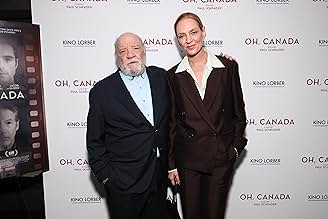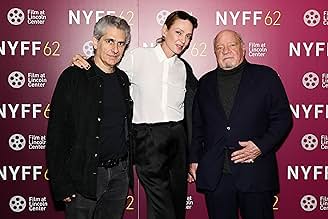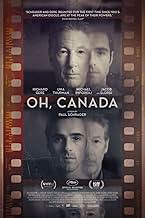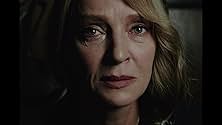VALUTAZIONE IMDb
5,6/10
2386
LA TUA VALUTAZIONE
Leonard Fife, uno dei sessantamila evasori e disertori che si rifugiarono in Canada per evitare di servire in Vietnam, condivide tutti i suoi segreti per smitizzare la sua vita mitizzata.Leonard Fife, uno dei sessantamila evasori e disertori che si rifugiarono in Canada per evitare di servire in Vietnam, condivide tutti i suoi segreti per smitizzare la sua vita mitizzata.Leonard Fife, uno dei sessantamila evasori e disertori che si rifugiarono in Canada per evitare di servire in Vietnam, condivide tutti i suoi segreti per smitizzare la sua vita mitizzata.
- Premi
- 1 vittoria e 2 candidature totali
Recensioni in evidenza
It's an accidental draft dodger drama between Virginia and Montreal in the late 1960s and 2023. Leo Fife (Jacob Elordi/Richard Gere) is a famous left-wing documentary filmmaker in Canada dying of cancer in 2023. Leo allows two former students, Malcolm (Michael Imperioli) and Diana (Victoria Hill), to interview him for a CBC documentary about his life. However, he insists his wife, Emma (Uma Thurman), also a former student, be present throughout the filming.
We soon learn the myth about Leo's past as an anti-Vietnam War resister and free-spirit traveler to Cuba varied from Leo's present (real?) truth. Leo is somewhat confused, but the story he tells is of a shallow, directionless life that caused much pain to others, including two former wives, Amy (Penelope Mitchell) and Alicia (Kristine Froseth), and son Cornel (Zach Shaffer). We learn Leo's flight to Canada did not match the myth.
"Oh, Canada" is a strange film in many ways, but it tells an engaging story about the myths we all allow to be made about ourselves. Paul Schrader's use of several actors in multiple roles is confusing and unnecessary, but Richard Gere does a great job struggling to tell his truth to the woman with whom he's spent 30 years. Uma Thurman is good in portraying Emma as initially resisting Leo's truthtelling but moving towards quiet acceptance.
"Oh, Canada" is not about dodging the Vietnam War; it's instead a drama about coming to terms with one's own myths.
We soon learn the myth about Leo's past as an anti-Vietnam War resister and free-spirit traveler to Cuba varied from Leo's present (real?) truth. Leo is somewhat confused, but the story he tells is of a shallow, directionless life that caused much pain to others, including two former wives, Amy (Penelope Mitchell) and Alicia (Kristine Froseth), and son Cornel (Zach Shaffer). We learn Leo's flight to Canada did not match the myth.
"Oh, Canada" is a strange film in many ways, but it tells an engaging story about the myths we all allow to be made about ourselves. Paul Schrader's use of several actors in multiple roles is confusing and unnecessary, but Richard Gere does a great job struggling to tell his truth to the woman with whom he's spent 30 years. Uma Thurman is good in portraying Emma as initially resisting Leo's truthtelling but moving towards quiet acceptance.
"Oh, Canada" is not about dodging the Vietnam War; it's instead a drama about coming to terms with one's own myths.
10parisdv
I watched this at Cannes, at the film's premiere.
OH, CANADA is a highly original film by one of the masters of cinema, a real work of art. The film is beautifully made with a strong visual look. It features beautiful cinematography and great production design. The acting is strong, especially Richard Gere who plays the protagonist. He gives a terrific and memorable performance in the vein of Jack Nicholson in FIVE EASY PIECES- a complicated, not always likable but compelling character.
It may not be everyone's cup of tea but I think it is one of Paul Schrader's greatest achievements, and a gift to cinema lovers. Recommended.
OH, CANADA is a highly original film by one of the masters of cinema, a real work of art. The film is beautifully made with a strong visual look. It features beautiful cinematography and great production design. The acting is strong, especially Richard Gere who plays the protagonist. He gives a terrific and memorable performance in the vein of Jack Nicholson in FIVE EASY PIECES- a complicated, not always likable but compelling character.
It may not be everyone's cup of tea but I think it is one of Paul Schrader's greatest achievements, and a gift to cinema lovers. Recommended.
At best, this appears to be a case of Paul Schrader reading a novel and getting so impressed by it that he leapt straight into adapting the parts he seemingly considered most relatable, and somewhere along the way, he appears to have forgotten most of his audience would not have read that novel and so be lost when it comes to what he considers "obvious". At worst...well, consider that a director who just two years ago claimed "woke Oscars mean less each year" had now made a film where the moral center of its universe is a pillar of 1960s medium enterprise capitalism, and we are effectively told outright the main character's life had been a failure ever since he abandoned his chance to succeed in his footsteps and pursued filmmaking instead. Quite a coincidence, don't you think?
To clarify, I am fine with the premise that the main character is a jerk. Lots of great fiction features a badly (at times overwhelmingly) flawed protagonist - but to be great or at least good, it needs to be interesting! "Leonard" here is shown to be unsympathetic so early and so decisively, the narrative then proceeds to simply compound the point we already know, and not in captivating ways either. Perhaps the novel was more careful about building Leonard Fife up first so that knocking him down would actually be dramatic but Schrader neglected it; perhaps, he assumed viewers would associate the main character with himself (some reviewers certainly appear to have made that connection, even I very much doubt it) and thus project the films Schrader directed IRL onto him. However, it is just as possible this is simply how Schrader thought the story ought to be, with no other caveats.
Even worse is that the film is actively hostile to not just him as a person, but also to his work and seemingly the entire field of documentary filmmaking. A talented artist being an awful person is a frequent, completely believable story - but here, he effectively stumbles into success. Even after his first lucky break, he is never shown doing anything which requires skill (other than perhaps being able to quote Sontag) - and yet, he is feted as an icon by the Canadian society as a whole and by his colleagues. The unmistakable implication is that the other documentarians work even less than he did, and the effete Canadian society is unable to tell a real talent from a fraud. Considering that Schrader has little connection to Canada and the only thing he ever made which can charitably be called a documentary is a 5m short about his painting, it's hard to avoid viewing this as a reflection of personal beliefs.
Funnily enough, the strongest parts of the film all involve what would ordinarily be a mere framing device. The film would unironically be better if it never left that one house in the present day, if it was just Richard Gere rambling on aloud and in his internal monologue while Uma Thurman is trying in vain to hold him back and we never got to see a single flashback play out on the screen.
To clarify, I am fine with the premise that the main character is a jerk. Lots of great fiction features a badly (at times overwhelmingly) flawed protagonist - but to be great or at least good, it needs to be interesting! "Leonard" here is shown to be unsympathetic so early and so decisively, the narrative then proceeds to simply compound the point we already know, and not in captivating ways either. Perhaps the novel was more careful about building Leonard Fife up first so that knocking him down would actually be dramatic but Schrader neglected it; perhaps, he assumed viewers would associate the main character with himself (some reviewers certainly appear to have made that connection, even I very much doubt it) and thus project the films Schrader directed IRL onto him. However, it is just as possible this is simply how Schrader thought the story ought to be, with no other caveats.
Even worse is that the film is actively hostile to not just him as a person, but also to his work and seemingly the entire field of documentary filmmaking. A talented artist being an awful person is a frequent, completely believable story - but here, he effectively stumbles into success. Even after his first lucky break, he is never shown doing anything which requires skill (other than perhaps being able to quote Sontag) - and yet, he is feted as an icon by the Canadian society as a whole and by his colleagues. The unmistakable implication is that the other documentarians work even less than he did, and the effete Canadian society is unable to tell a real talent from a fraud. Considering that Schrader has little connection to Canada and the only thing he ever made which can charitably be called a documentary is a 5m short about his painting, it's hard to avoid viewing this as a reflection of personal beliefs.
Funnily enough, the strongest parts of the film all involve what would ordinarily be a mere framing device. The film would unironically be better if it never left that one house in the present day, if it was just Richard Gere rambling on aloud and in his internal monologue while Uma Thurman is trying in vain to hold him back and we never got to see a single flashback play out on the screen.
Richard Gere is a respected maker of hard-hitting, muckraking documentary films. He works with his wife and producer, Uma Thurman. Many years ago he fled from the United States in protest over the Viet Nam War. Now it is 2023, he is dying, and several students of his are making a documentary, interviewing him over the protests and under the watchful eye of his producer and wife, Uma Thurman.
Schrader is a careful writer, and there are several ways to interpret this movie. Certain critics have called it "autobiographical" because they are so intellectually lazy that they can't be bothered to think more than one thought before they give up. There may be autobiographical points to this movie. Certainly the movie reflect Schraeder's opinions, rather, than say, a panda bear's, or those of a large lump of rock scraped down from the Laurentian Shield into the terminal morrain of Long Island. That, I believe, doesn't make it autobiographical, nor does the fact that the guy is a film maker. There are film makers and film makers. Even though Gere and the folks making the film-within-the-film want to make a sensational film no matter what the cost, Miss Thurman's only wish is to protect her husband, even though she already knows the worst.
I did consider whether this was a meditation on film making itself. It certainly has aspects of that. A film maker will shoot many more feet of film than he winds up needing, and edits it into a final form that may or may not bear any relationship to reality or the film maker's original intentions. As Gere dies on camera and over the course of the movie, the events of his life that he wishes to tell come up confused and mishappen, conflating and confabulating with each other. To make sense of that, to make a movie of that -- for the guys within the film already have a contract to sell the film -- will require an editor. That is the true work of any story teller: to arrange events and characters within a story, so that it makes sense to the audience.
But more central to understanding this film is to see that, like others in Schraeder's body of work, it is primarily concerned with outrage. In some ways his work resembles that of Ingmar Bergman: raised religiously, he pondered human fallibility in a world with no G*d to lend an objective framework of right and wrong: puzzlement and disappointment, leaving the audience the question of how to work out a system of morality. Schraeder, on the other hand, seems outraged, filled with despair, and leaving the mess to be cleaned up by the unfortunate survivors. Gere leaves the film makers to make sense of his interview, and Miss Thurman to clean up the mess and lies he has made of his life. It's not Gere's problem: he's dead. And it's not Schraeder's.
Anyway, those are a couple of the ways of viewing the film that I came up with. If you see the movie, despite the fact there's not an explosion or a good joke on view, let me know if they make sense to you. And if you have any interpretations that are different, too.
Schrader is a careful writer, and there are several ways to interpret this movie. Certain critics have called it "autobiographical" because they are so intellectually lazy that they can't be bothered to think more than one thought before they give up. There may be autobiographical points to this movie. Certainly the movie reflect Schraeder's opinions, rather, than say, a panda bear's, or those of a large lump of rock scraped down from the Laurentian Shield into the terminal morrain of Long Island. That, I believe, doesn't make it autobiographical, nor does the fact that the guy is a film maker. There are film makers and film makers. Even though Gere and the folks making the film-within-the-film want to make a sensational film no matter what the cost, Miss Thurman's only wish is to protect her husband, even though she already knows the worst.
I did consider whether this was a meditation on film making itself. It certainly has aspects of that. A film maker will shoot many more feet of film than he winds up needing, and edits it into a final form that may or may not bear any relationship to reality or the film maker's original intentions. As Gere dies on camera and over the course of the movie, the events of his life that he wishes to tell come up confused and mishappen, conflating and confabulating with each other. To make sense of that, to make a movie of that -- for the guys within the film already have a contract to sell the film -- will require an editor. That is the true work of any story teller: to arrange events and characters within a story, so that it makes sense to the audience.
But more central to understanding this film is to see that, like others in Schraeder's body of work, it is primarily concerned with outrage. In some ways his work resembles that of Ingmar Bergman: raised religiously, he pondered human fallibility in a world with no G*d to lend an objective framework of right and wrong: puzzlement and disappointment, leaving the audience the question of how to work out a system of morality. Schraeder, on the other hand, seems outraged, filled with despair, and leaving the mess to be cleaned up by the unfortunate survivors. Gere leaves the film makers to make sense of his interview, and Miss Thurman to clean up the mess and lies he has made of his life. It's not Gere's problem: he's dead. And it's not Schraeder's.
Anyway, those are a couple of the ways of viewing the film that I came up with. If you see the movie, despite the fact there's not an explosion or a good joke on view, let me know if they make sense to you. And if you have any interpretations that are different, too.
Perusing the reviews already on here regarding this movie. I notice there are a wide range of scores and views. Some giving it 8 or higher pronouncing it a work of genius. Where as others are giving it a 3 or less. Claiming it a bunch of pretentious rubbish.
Where do I stand? Hmm. I've just watched it and I am still digesting. It is possibly a movie to be watched several times to get the true meaning. Although I must admit there is no way I would sit through this film again. I'm pleased I have seen it but it certainly will not be going in my bag of films to watch again.
I'm going down the middle with a 5. That's possibly being too kind.
Where do I stand? Hmm. I've just watched it and I am still digesting. It is possibly a movie to be watched several times to get the true meaning. Although I must admit there is no way I would sit through this film again. I'm pleased I have seen it but it certainly will not be going in my bag of films to watch again.
I'm going down the middle with a 5. That's possibly being too kind.
Lo sapevi?
- QuizSecond time that Paul Schrader has adapted one of Russell Banks' novels for the screen, following Affliction (1997).
- ConnessioniFeatured in The 7PM Project: Episodio datato 28 marzo 2025 (2025)
I più visti
Accedi per valutare e creare un elenco di titoli salvati per ottenere consigli personalizzati
Dettagli
- Data di uscita
- Paesi di origine
- Lingue
- Celebre anche come
- Канадець
- Luoghi delle riprese
- Harriman, New York, Stati Uniti(The scene that was filmed here is supposed to be a scene where the character played by Jacob Elordi, crosses over into Canada.)
- Aziende produttrici
- Vedi altri crediti dell’azienda su IMDbPro
Botteghino
- Lordo Stati Uniti e Canada
- 200.980 USD
- Fine settimana di apertura Stati Uniti e Canada
- 31.869 USD
- 8 dic 2024
- Lordo in tutto il mondo
- 1.276.529 USD
- Tempo di esecuzione1 ora 31 minuti
- Colore
- Mix di suoni
- Proporzioni
- 2.35 : 1
Contribuisci a questa pagina
Suggerisci una modifica o aggiungi i contenuti mancanti









































